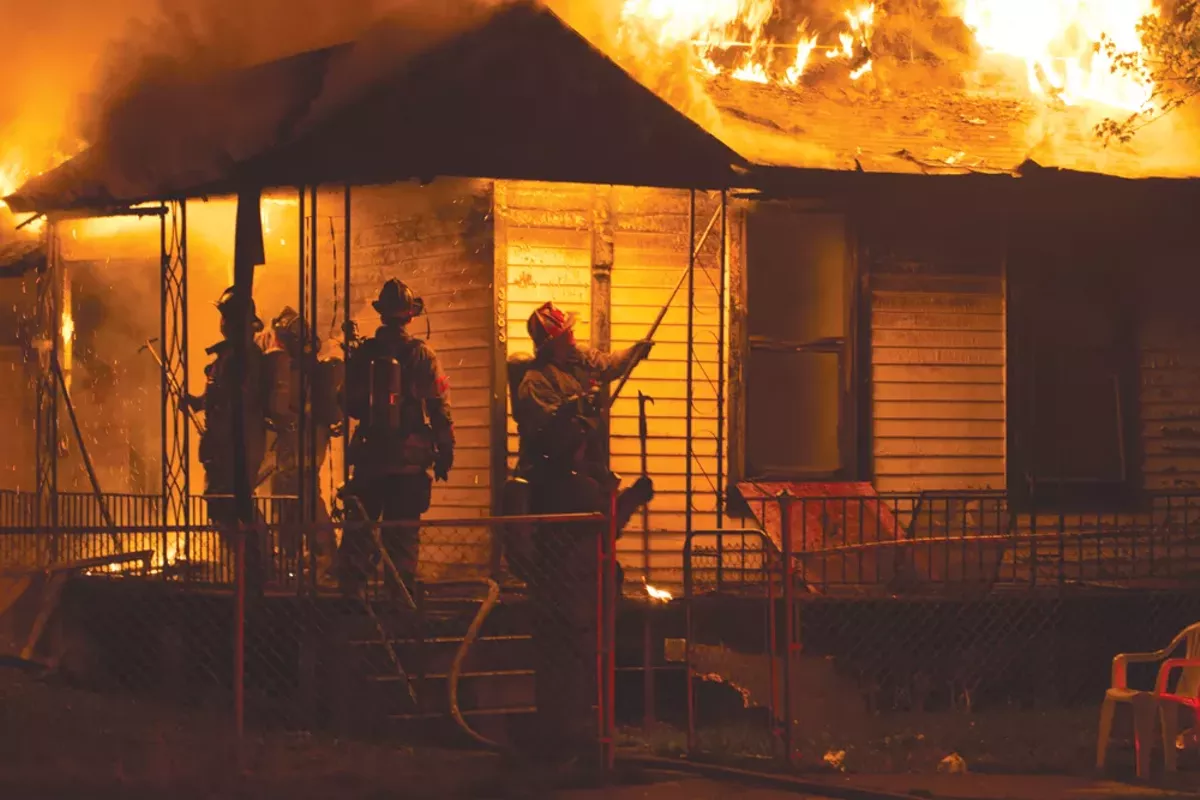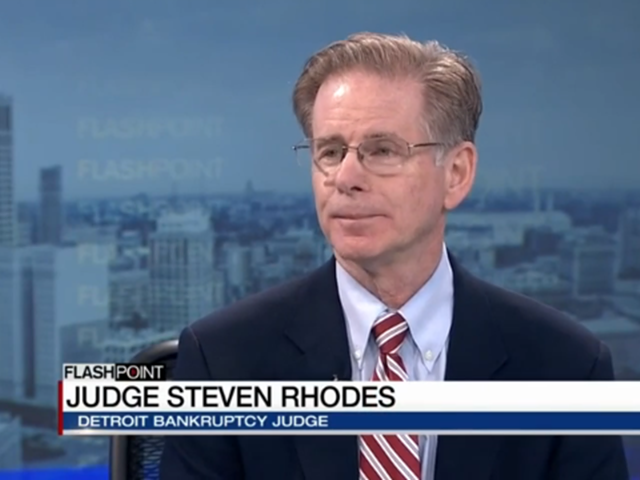What's left of the old house at 3383 15th St. in North Corktown is the type of horror show that's so commonplace in a city no longer fazed by overwhelming levels of post-industrial wreckage that anyone who lives here could easily fail to take note.
Only portions of a few walls still stand after a July 2015 fire turned much of the house to ash. A busted basketball hoop now sits in what appears to have been the living room, and the twisted, charred pile sits about 10 feet from an occupied home.
No one knows when the remains might be cleared, and in the meantime it's collecting random junk. While sadly visually unremarkable, the 15th Street rubble also shares a similar backstory with tens of thousands of other vacant structures and blighted properties citywide.
That part of the story is worth a look. As is typical, the person who owns the home isn't a Detroiter nor anyone who appears to particularly care about its impact on the neighborhood. It's one of 32 that Jimmy Lai, a billionaire media mogul in Hong Kong, bought at the 2013 Wayne County tax foreclosure auction, according to Loveland Technologies, a company that tracks Detroit's parcels.
On its face, the idea of a powerful Hong Kong media mogul showing interest in Detroit is exciting, especially after decades of private disinvestment. However, like many investors — from places like Utah, Florida, France, and Oakland County — who charge at the annual auction for its doorbuster deals, Lai doesn't appear to be spending much money beyond acquiring the properties, says Alexander Samul.
The longtime North Corktown resident lives across the street from a Lai eyesore, which some residents have shortened to "Lai-sores." Samul met several times with Lai's local agent — Ann Arbor businessman, conservative activist, and former Rick Santorum aide Joseph Cella — to talk about the blighted properties.
Their discussions even led to Cella offering Samul a job on the Lai team, Samul says — a proposition he turned down. But Samul kept in touch with Cella, alerting him to unmowed grass, caving roofs, and other blight issues long after Cella quit returning calls and texts. Cella didn't return calls for comment from MT.
During their discussions, Cella said they intended to renovate the homes, but the city wanted Lai to pull permits and the idea got too expensive, Samul says, adding that the justification Cella offered up stunned him.
"He said, 'There are abandoned houses all over the city — who really cares?'"
Naturally, Samul wasn't thrilled.
"This is people's lives, safety, money, houses, investment ... there are a bunch of people who give a shit," he tells MT, clearly exasperated.
"You don't need a permit in Detroit to put a new roof on and maintain properties and secure the houses and mow the lawn. Your investor is a billionaire; have your billionaire investor spend some money!"
North Corktown is a fairly tight-knit community. Many of its homeowners paid off their houses a generation ago, and its sparsely populated blocks are among the city's hottest real estate. That's due in part to the neighborhood's proximity to buzzing Michigan Avenue, home to some of Detroit's most popular bars and restaurants, and a safe spot for suburbanites getting newly acquainted with any part of the Detroit that's not Joe Louis Arena, Comerica Park, or the Lodge entrance ramp.
Samul, who owns the nearby Detroit Moped Works, says he suspects that's partly what led Lai and Cella to the neighborhood. Records from Loveland Technologies show Lai paid $642,900 for the 32 properties he purchased at the 2013 auction.Many likely would have landed in the county's second auction of less desirable, unsold properties available for a starting bid of $500. It's generally agreed among those in the neighborhood that the Lai/Cella team overpaid from the start, dooming their effort to make any real money any time soon.
And that's why out-of-town speculators who view neighborhoods like North Corktown as a gold mine instead of a community are bad for the city, says Bill Cheek, who's part of the North Corktown Neighborhood Association.
"It's a travesty what happened there," Cheek says of the 15th Street house. "It's a microcosm of the out-of-town speculation that has been going on in Detroit for a generation, and all it has done is contribute to the cycle of decline. What in the world some Hong Kong billionaire needs to speculate on a bunch of lots in a Detroit neighborhood for, I don't know, but I find it really quite offensive."
It's neighbors like Samul, Cheek, and Terri Burns, who lives with her son Maurice next door to 3383 15th, who must deal with the collateral damage from foreclosures.
"We've been trying to get this house down because it's a hazard," says Burns, who's lived on the block for three years.
Burns' dog, Iowa, woke her in the early morning hours on July 2 of last year when 3383 15th caught fire. The heat and flames damaged the side of the rental where Burns lives.
A cause or origin of the blaze wasn't available from the Detroit Fire Department.
Ten months later, the mother and son still have a view of the charred debris every time they look out a window or walk outdoors.
The Wayne County tax foreclosure auction is the nation's largest. Over the last three years, 78,000 parcels went on the block, of which 37,000 sold for just over $170 million. Over the last 10 years, about 133,000, or 30 percent, of Detroit's parcels went through the foreclosure process, and many ran through more than once.
This year, 20,000 more properties are likely to hit the block, says Wayne County Treasurer Eric Sabree.
To put that in perspective, Cincinnati holds 141,000 parcels total. Or compare the tax foreclosure numbers to the mortgage foreclosure crisis, which saw 67,000 Detroit residents lose their homes between 2005 and 2009.
This crisis is much worse and enduring, and, via the tax auction, is resulting in an unprecedented transfer of land ownership from local hands to suburban, national, and international investors' real estate portfolios.
Those close to the issue, like Greg Markus, a housing activist with the Detroit Action Commonwealth, say that's a bad thing.
"It's mostly speculators who are willing to gamble that this might pay off somewhere down the road," Markus says. "In the meantime, the houses sit there, they're not improved, nobody lives in them, speculators do nothing, and in three years they're back in foreclosure, but now they're burned out and vandalized, and eventually demolished at the cost of tens of thousand of dollars apiece.
"It doesn't make economic sense, and it's a horrible process."
The numbers from recent years support his assessment. The foreclosure process takes three years, so properties sold in 2013 that are back in foreclosure will be auctioned again in 2016.
An examination of 2013 county tax foreclosure data by MT and Loveland found nearly 79 percent of the properties purchased in the 2013 tax foreclosure auction are either back in foreclosure or are soon to be foreclosed.
That means around 7,000 of the expected 20,000 properties in the 2016 auction will be 2013 reruns. As of now, $71,795,632 in back taxes are owed on properties purchased in the 2013 auction, and most of that debt is owed by out-of-towners.
What's worse, most of those 7,000 rerun properties have sat vacant, unattended, open to the elements, and neglected for three years.
If the homes had any hope prior to the 2013 auction, they sure don't now. And at around $15,000 a pop to demolish, a cost that will likely be footed by taxpayers, the damage cuts in many directions.
"Everyone has a house like that on their block," says Bree Brooks, who lives near a Fleming Street home that's one of 414 bought at auction by Singapore businessman E.E. Meng Peh. "It's obvious what it does, and no one knows when it'll be gone."
So why do speculators in Singapore and Hong Kong or anywhere else think the smart money is on Detroit?
The confluence of several forces appear to have made Detroit real estate attractive to investors. Blight is increasingly viewed as an opportunity and, especially in 2013, grabbing up large amounts of Detroit properties became fashionable — Loveland and county data show the top 10 buyers made 24 percent of the 2013 auction purchases that had over 2,300 bidders.
As the rest of the nation recovered from the recession, Detroit struggled and stock market wariness led investors toward real estate.
At the same time, the trend of younger people across the country leaving the suburbs for the city continued, and it was around this time that the media began blaring the "Detroit comeback" narrative. Part of the suddenly trendy city's story included the promised riches in the decaying $500 home, and investors descended upon Detroit.
What they discovered was an understaffed, underfunded government monitoring a property trove. Without adequate policing of the process — and the city lapping up the accelerated private sector attention after decades of cold shoulders — investors quickly began taking advantage of the situation.
But it doesn't have to be this way. The tax foreclosure auction has the potential to be a "potent democratic tool for advancing the numbers of individual homeowners," Michele Oberholtzer previously wrote in MT. She's the founder of the Tricycle Collective, a nonprofit that works to keep owner-occupants facing tax foreclosure in their homes. But instead, the auction "systematically discourages the stabilizing forces of homeownership while acting as a siphon to concentrate property into speculators' hands."
And it's mostly individuals dealing with the consequences. According to Loveland data, of 6,000 occupied homes sold in the 2014 auction, 1,000 are now vacant. The organization tracks speculators like Stevey Hagerman, an agent representing investors in Florida and France, who buys occupied homes that Loveland says he then tries to sell to the occupant at a large profit. If the occupant refuses the offer, they're evicted.
Hagerman says the company offers the homes back to those living there, though at a much higher price than it was purchased for in the auction. If that doesn't work out, the house is offered as a rental. If those terms can't be agreed upon, the occupant has to leave.
"No one can live for free," Hagerman says, adding that many of the people that his team evicts are squatters.
Peter Hammer, director of Wayne State University Law School's Damon J. Keith Center for Civil Rights, says a vast number of Detroiters are made homeless by the the tax foreclosure process.
"It's hard to get your mind around what the numbers are and the human cost inflicted on poor residents of the city."
Miles from the blight set like mold on many Detroit neighborhoods is the well-maintained, 3,376-square-foot West Bloomfield Township home belonging to Derek Washam.
Loveland records show the taxes are current on Washam's house, which is valued at $335,000.
On his Detroit properties, he owed $751,517 in back taxes until filing for bankruptcy in 2015, court documents show. The seemingly sensible city and county response would be to take his parcels, flag his name, and determine to never do business with him again.
But the opposite occurred. Not only did Washam keep his properties — with back taxes running as high as $42,000 for one home – but Loveland found he grabbed dozens more parcels at the 2015 auction for $446,000. Those properties were quickly transferred to around 20 different LLCs.
Just to be clear: Loveland found Washam filed for bankruptcy because he allegedly couldn't pay $751,000 in back taxes, but at the same time somehow spent $446,000 buying more properties.
When reached by MT, Washam denied that he bought properties in the 2015 auction.
"That stuff has nothing to do with me," he says, before refusing to answer any more questions.
However, Treasurer Sabree confirmed Washam indeed won the auctions, though Sabree says it's common for local agents to buy houses for out-of-town investors and immediately hand over the deed.
In the county's defense, Washam partly covered his identity by operating under six LLCs that Loveland was able to find. Court records show Washam was at least attempting to enter a payment plan as part of the foreclosure process, but it's not clear whether one was ever signed and enforced.
And it doesn't change the fact that Washam's payment plan should've included the $446,000 spent on buying more homes.
Moreover, Loveland discovered that at least some of his properties are Section 8. That means Washam's taking taxpayer money as income, but isn't staying current on taxes.
How can this be? Loveland says it presented Washam's file Feb. 3 to former Wayne County Treasurer Richard Hathaway and his response was, "Thank you for the info."
Imagine a Detroit with a vast network of open space, fields, urban prairies, and urban farms that wrap around densely packed neighborhoods, providing a sense of order in a city that's fallen into post-industrial disorder.
City leaders have imagined such a city, and that's because it would be much more manageable and cost effective than Detroit's present layout — it isn't practical or cheap to provide city services on thousands of blocks holding one or two houses.
Those blocks will never regenerate within our lifetime, and their full depopulation is partly viewed as a good thing by the developers and politicians designing the framework for Detroit's later stage comeback, says Detroit Action Commonwealth's Markus.
The idea of shrinking the city was first seriously proposed as part of the Detroit Future City plan, but some people living in the scattered houses don't necessarily want to move, and even if they did, the city's relocation costs would be high.
The plan keeps coming up in conversations when I ask why Detroit isn't acting faster to address the issues.
"Huge swaths of city in the future will not have residents, and they're making that plan with no public money for relocation, no exercise of eminent domain — so how do you have huge change and turn occupied blocks into public land without any expenditure of public resources?" Wayne State's Hammer asks. "Massive tax foreclosures and massive water shut-offs ... are the only rational explanations."
There's also a financial incentive for the city to let homes fall into tax foreclosure. When a home is foreclosed on, the county pays its back taxes to the city. But that's a short-term solution with long-term consequences, and ultimately the county can hit cities with a bill called a chargeback if the auction fails to collect enough money to cover the back taxes owed.
There's also the issue of the city of Detroit's assessing policies. It's no secret that the city assessed properties at a high value in a misguided effort to stay afloat over the last decade. That left a city full of impoverished residents paying absurdly high taxes, and the obvious consequence was a wave of tax foreclosures that hit town as the rest of the nation recovered from the mortgage crisis.
The results are clear, Markus says.
"The government and the city is in this precarious financial position for different reasons, so it wants to maximize its revenues in the short term, but this has placed everyone in the situation we're in now, which is unhealthy for Detroit, and disastrous in the long term," he says.
No one took a larger or more impressive haul away from the 2013 auction than Wendy Briggs. The Pontiac-based real estate agent snagged a collection of 428 properties scattered throughout Detroit and Wayne County for the bargain basement price of $379,000.
However, it appears Briggs didn't consider secondary costs, and she's hardly alone in that regard.
She now owes $4.7 million in back taxes on the properties, and around 95 percent of those are headed to the 2016 tax foreclosure auction, records show. And the city already spent $229,000 demolishing some of her more blighted properties.
Briggs didn't return calls from MT, and data from Loveland doesn't show whether her houses are occupied. But it's worth mentioning that Briggs lives in a 4,642-square-foot historic single-family home in Pontiac. Her taxes on that property are current, according to Loveland records.
Of the 38,000 foreclosure notices the county sent out this year, 20,000 were for tax bills that totaled less than $3,000, Sabree says.
Of that, about 5,500 homeowners owed under $2,000, and 650 owed less than $500. The county is focusing on alerting those individuals, Sabree says, and offering payment plans, if necessary. That in part is why he estimates only foreclosing on around 20,000 properties instead of 38,000.
The state's temporary reduction of interest rates on tax payment plans from 18 percent to 6 percent saved a lot of homes, Sabree says, but it's up to state lawmakers to extend the expiring break.
"You have got to go back to the state law," he says. "It's not so much an issue of resources — the law has to be changed."
Still, several other new rules and policies have helped. The county developed the "blight bundle," in which Detroit's most blighted properties are bundled together to discourage speculators from buying them individually. A buyer must take the entire bundle, which starts at $3.5 million, and includes a sales agreement requiring the demolition of hopeless properties and maintenance of structures that can be rehabbed.
"It's too onerous for most people and speculators," Sabree says.
It's now illegal for anyone who owes back taxes to buy homes off the auction block or receive the deed, though speculators often skirt that with shell LLCs. The staff at Loveland, which tracks some of those playing the shell game, say the city and county don't have the resources to police speculators.
State law also now requires buyers to pay current summer taxes before receiving the deed to a home bought at the foreclosure auction, and the deed requires the buyer to pay winter taxes. If the winter taxes and following summer taxes aren't paid, then the county can take the property back under the sale's reverter clause. Catherine McClary, neighboring Washtenaw County's treasurer, is using the tool with success, and Sabree says Wayne County will soon use it more.
But housing activists say more can be done locally, pointing to the exemption that exempts those in poverty from paying most of or all their property taxes.
Markus calls it a wonderful tool in what's one the nation's poorest major cities, but, not surprisingly, the filing process is cumbersome, to put it mildly — one must fill out an application for the application.
"The reason it's low visibility is the city clearly doesn't want people to know about it," Markus says.
The city recently said property assessments will drop, and Sabree tells me his office is specifically working to inform more residents of the exemption, as well as the payment plans, housing money available to veterans, counseling programs, and other tools to keep owner-occupants in the home.
"That's really the main thing that we can do, is (to) inform," Sabree says.
There's also concern over the rule that prohibits those with delinquent taxes from purchasing houses in the auction. It's designed for the Derek Washams of the world, but it also drives away individual occupant-owners trying to "re-purchase" their home in the auction, says the Tricycle Collective's Oberholtzer. Once a home is foreclosed on, the property no longer has delinquent taxes.
But the new rule presents a gray area, and owner-occupants who fear violating the law are less adept at creating shell corporations, and can't receive help from nonprofits because agencies aren't clear on the law, Oberholtzer says.
"Meanwhile, the real estate magnates continue on, unimpeded, either brazenly in their old names or cautiously under new reincarnations," she says.
There's evidence some of the new measures have worked, as has a greater awareness of the pitfalls that come with buying a cheap home in Detroit — who would've ever imagined it wasn't as simple as "buy this deteriorating house, plan your retirement!"? While the top 10 investors bought 2,640 properties in 2013, the top ten only bought 1,425 in 2016.
However, those buying a small number of properties aren't necessarily any better, and are sometime worse, than investors like Briggs, says United Community Housing Coalition's Ted Phillips. It's with small-time investors that he encounters the old line of "You should be happy. I'm coming in to save your city."
"I don't need somebody coming in and saving me, and it's really incredibly offensive to say so," Phillips says. "But it's doubly offensive when people act like they're there to repopulate the city ... but what they're doing is really just another way to make a killing off Detroit."
His frustration matches that which North Corktown's Bill Cheek expresses over the neighborhood and its Lai-sores. He theorizes suburban investors' approach to Detroit is a result of the burbs' failures to provide a sense of community. The speculators simply don't understand how their decisions impact the neighborhood, because they don't know how a neighborhood works.
"They think Detroit is just a bunch of criminals who don't care and the city is meaningless to them. The idea of a neighborhood or community is a foreign concept to these people," Cheek says. "Not to be strident about it but ... it's obvious speculating and they don't understand or care about the idea of this community."
Tom Perkins is a Hamtramck-based freelance journalist. He last wrote "The battle between Detroit and its dispensaries begins" in the April 13 MT.
Dustin Blitchok contributed to this report.








